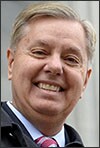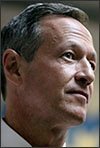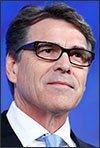Former R.I. Gov. Lincoln Chafee (D)

Lincoln Chafee, who served as a U.S. senator from Rhode Island and later as the state’s governor, announced June 3 that he would seek the Democratic Party’s 2016 presidential nomination.
Mr. Chafee was a Republican when he served in the U.S. Senate, from 1999 until 2007, the year he left the party. He took office as governor of Rhode Island in 2011 as an Independent, and switched affiliation to become a Democrat in 2013. He did not seek re-election to that office, and his term ended this past January.
As governor, Mr. Chafee oversaw the rollout of the state’s $75 million federal Race to the Top grant and a $50 million grant specifically for early-learning programs. He has been supportive of the Obama administration’s education agenda.
–Lauren Camera
U.S. Sen. Lindsey Graham (R)

Sen. Lindsey Graham of South Carolina, who last week joined the race for the 2016 Republican presidential nomination, has pushed for a scaled-back federal role in education over the course two decades in Congress, most recently with a legislative proposal that takes aim at the Obama administration’s involvement with the Common Core State Standards.
Mr. Graham, who was elected to the U.S. Senate in 2002, joined the U.S. House of Representatives in 1995 and was on the education committee that tried to dismantle the federal Department of Education or merge it with the Department of Labor.
In the House, Mr. Graham was a key player among a group of GOP members of Congress that helped delay a proposed national testing plan being pushed by President Bill Clinton’s administration. In addition, Mr. Graham was involved in the negotiations on a final version of the No Child Left Behind Act.
–Lauren Camera
Former Md. Gov. Martin O’Malley (D)

Former Gov. Martin O’Malley, who tossed his hat into the ring for the 2016 Democratic presidential nomination May 30, spent time on a range of education issues as Maryland’s chief executive from 2007 to 2015, and before that as Baltimore’s mayor, starting in 1999.
As mayor, Mr. O’Malley led a campaign to make hiring youths a priority. He led Baltimore at a time when the city’s then-90,000-student school system was undergoing radical restructuring that included a $42 million loan to avert a financial meltdown. And in 2010, the National Education Association gave him its annual America’s Greatest Education Governor Award for his increases in K-12 education spending and school construction funds, and the creation of an independent labor board to handle bargaining disputes.
But the early years of his governorship were largely overshadowed by policy battles with then-state Superintendent of Schools Nancy S. Grasmick. In Maryland, the education chief is appointed by the state board of education.
–Lauren Camera
Former Texas Gov. Rick Perry (R)

Former Gov. Rick Perry, who touted the Lone Star State’s graduation rate during his tenure and opposed the Common Core State Standards, announced June 4 that he will seek the GOP nomination for president in 2016.
Mr. Perry, who served as governor of Texas from 2000 to 2015, also sought the GOP nomination in 2012. He has opposed various elements of federal education policy—including the No Child Left Behind Act and the Race to the Top competitive-grant program—for applying, in his view, too many conditions to funding. In 2010, he fought Democrats in Congress over the use of the $10 billion Education Jobs Fund, and has called for the U.S. Department of Education to be eliminated.
At some points during his tenure, Mr. Perry supported increased education funding; in 2007, for example, he supported a $80 million hike for the state’s pre-K program, as well as an $11.9 billion increase for public schools over the 2007-08 two-year budget cycle. However, the state cut school funding by $5.4 billion in 2011 in the wake of the recession. Those budget reductions have since been the subject of a lawsuit that is now before the Texas Supreme Court.
Mr. Perry is also a supporter of charter schools and private school choice.
–Andrew Ujifusa





